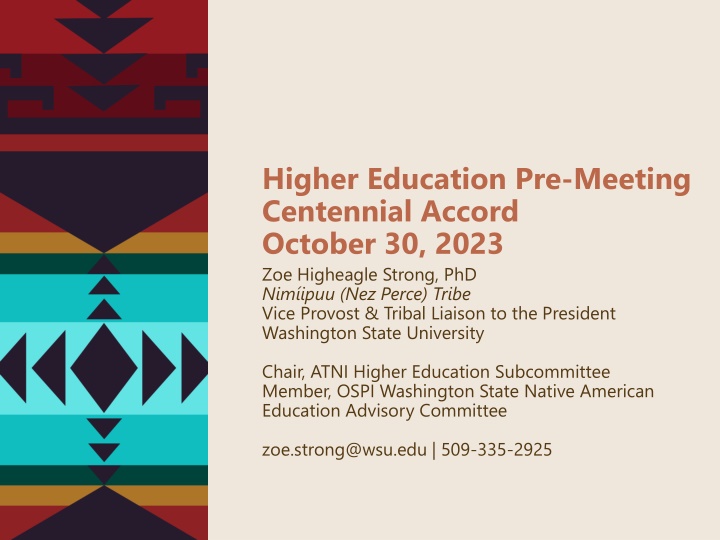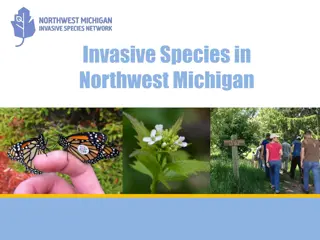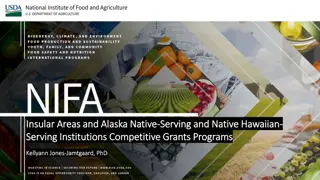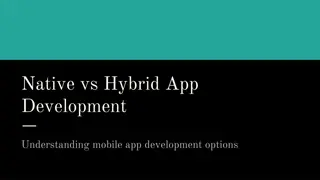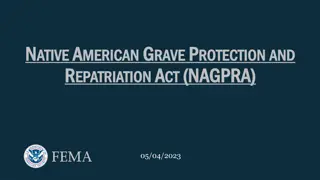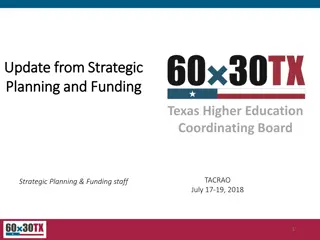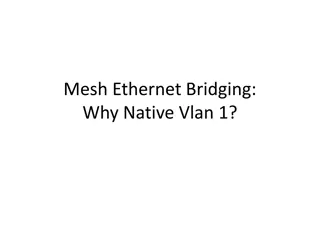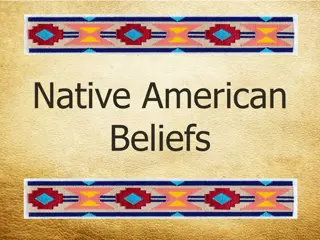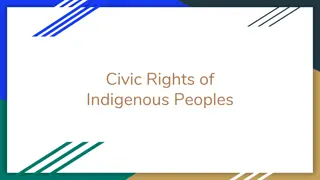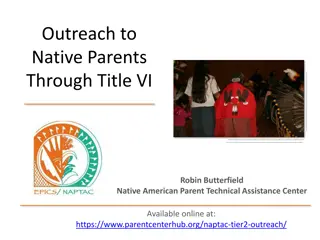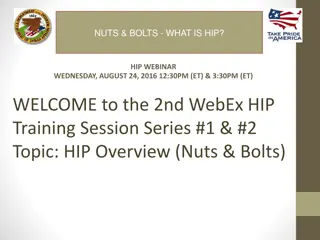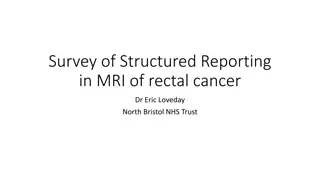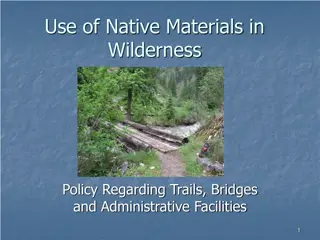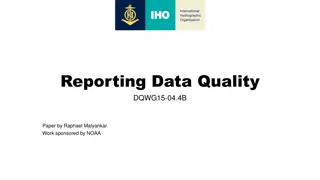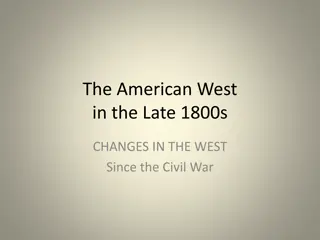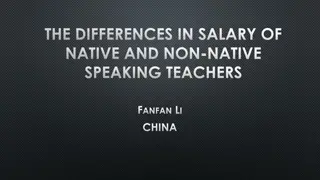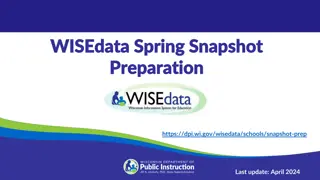Transforming Native Higher Education Data Reporting: Challenges and Solutions
Native identification and data problems in higher education impact accurate reporting and hinder access to resources for AI/AN students. The current reporting practices undercount and misidentify students, overlooking tribal affiliation. Tribal liaisons in higher education aim to address these issues by advocating for Native students and facilitating collaboration among institutions.
Download Presentation

Please find below an Image/Link to download the presentation.
The content on the website is provided AS IS for your information and personal use only. It may not be sold, licensed, or shared on other websites without obtaining consent from the author.If you encounter any issues during the download, it is possible that the publisher has removed the file from their server.
You are allowed to download the files provided on this website for personal or commercial use, subject to the condition that they are used lawfully. All files are the property of their respective owners.
The content on the website is provided AS IS for your information and personal use only. It may not be sold, licensed, or shared on other websites without obtaining consent from the author.
E N D
Presentation Transcript
Higher Education Pre-Meeting Centennial Accord October 30, 2023 Zoe Higheagle Strong, PhD Nim ipuu (Nez Perce) Tribe Vice Provost & Tribal Liaison to the President Washington State University Chair, ATNI Higher Education Subcommittee Member, OSPI Washington State Native American Education Advisory Committee zoe.strong@wsu.edu | 509-335-2925
Topics of Discussion Native Identification & Data Problems in Higher Education Current Race/Ethnicity reporting practices from the Office of Management and Budget (OMB) create aggregate student groups based around the two- part ethnicity question: 1. Hispanic or Latino, or Not Hispanic and Latino. 2. Racial Category (e.g., American Indian or Alaska Native (AI/AN), White, Black or African American, etc.). AI/AN students are counted as AI/AN if respondent only selects category. If they also select Hispanic/Latino, this supersedes other selections, and they are counted only as Hispanic/Latino. If they don t select Hispanic/Latino but also select another ethnicity category along with AI/AN, student will be counted as two or more races. Example: According to Washington's Office of Financial Management, of the 137,000 students enrolled at all six of the public four-year colleges and universities, the state counts about 600 undergrads and 200 graduate students as AI/AN, as of fall 2022. WSU alone has over 700 undergrads and 123 grads. Problem: This practice significantly undercounts and misidentifies AI/AN students, ignores Tribal affiliation, leads to inaccurate educational data and evidence-based practices, prevents students access to scholarships, resources and opportunities. Tribal Liaisons in Higher Education ATNI Higher Education Committee facilitates meetings for Tribal Liaisons to share resources, collaborate, and advocate for Native students, programs and services. The Tribal Liaisons express their deepest gratitude for all the Tribal Leaders that serve on their committees and boards, and welcome feedback on how to minimize the burden on Tribes while maximizing the benefit for Tribes and students.
Higher Education Tribal Relations & Liaisons Eastern Washington University Erin Ross, Director of Tribal Relations eross1@ewu.edu University of Oregon Jason Younker, Asst VP & Advisor to the President jyounker@oregon.edu Evergreen State University Lyn Dennis, Tribal Liaison Lyn.dennis@evergreen.edu University of Washington Sheri Berdine, Director of Tribal Relations sher04@uw.edu Muckleshoot Tribal College Denise Bill, Executive Director of Adult & Higher Education Denise.bill@muckleshoot.nsn.us Washington State University Zoe Higheagle Strong, Vice Provost & Tribal Liaison to the President Zoe.strong@wsu.edu Northwest Indian College Justin Guillory, President jguillory@nwic.edu WA State Board Community & Technical Colleges Brenda Breiler, Director of Tribal Government Affairs gbreiler@sbctc.edu University of Idaho Yolonda Bisbee, Executive Director of Tribal Relations yobiz@uidaho.edu Western Washington University Laural Ballew, Executive Director & Tribal Liaison to the President Laural.ballew@wwu.edu
Further Discussion Growing Collaborations to Bring Evergreen Education and Holistic Support Services to Incarcerated Tribal Relatives Let us not forget about our incarcerated Tribal members. Building on the longstanding work of Evergreen s House of Welcome, Tribal Liaison, and Prison Education and Reentry Support Programs Collaborators are: Building partnerships to increase access to Evergreen education and holistic services including resources that will specifically assist incarcerated tribal relatives. Identifying current barriers for incarcerated and recently released Tribal relatives. WSU Native American Scholarship Program HB1399 Would have established a Native American scholarship program for students who are enrolled in federal recognized Tribes but did not pass. WSU, a land grant institution, was founded in 1890 through the Morill Act of 1862 that provided each state with public and federal lands that are traced back to the dispossession of Indigenous lands. WSU has several programs, scholarships, and services for Native students, and work towards meeting the full cost of attendance for Native students. WSU received a budget proviso of $1.2 million, sponsored by Representative Lekanoff to develop and pilot a Native American scholarship program to increase recruitment, retention and graduation of students enrolled in federally recognized tribes. Washington State Tribes and bordering Tribes listed in the American Indian Residency Bill are the funding priority under the proviso.
Listening Sessions: Establishing a Native Scholarship Program Washington State University Office of Tribal Relations will conduct Listening Sessions seeking comment from Tribes regarding the establishment and implementation of a Native American Scholarship Program to help cover the unmet financial cost of attendance for eligible Tribal Students. During the 2023 Washington State Legislation Session, sponsored by Representative Deborah Lekanoff, WSU received a $1.2-million budget proviso to establish and pilot a scholarship program for students who are members of federally recognized Tribes. WSU has also allocated other funding resources to provide wrap-around support and additional scholarship dollars to improve access, persistence, and graduation for Native students. Contact: Zoe Higheagle Strong, zoe.strong@wsu.edu Virtual Session Virtual Session Muckleshoot Tribal College Wednesday November 8, 2023 4:00 pm 5:00 pm Thursday Tuesday November 9, 2023 12:00 pm 1:00 pm November 14, 2023 11:30 am 1:00 pm Lunch will be provided RSVP by scanning QR code on the left, or email tribal.relations@wsu.edu Scan to register!
Questions / Comments Contact: Zoe Higheagle Strong Zoe.strong@wsu.edu (509) 335-2925
